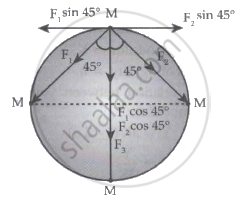Advertisements
Advertisements
Question
Four identical particles of equal masses 1 kg made to move along the circumference of a circle of radius 1 m under the action of their own mutual gravitational attraction. The speed of each particle will be ______.
Options
`sqrt(((1+2sqrt2)"G")/2)`
`sqrt("G"(1+2sqrt2)`
`sqrt("G"/2(2sqrt2-1)`
`sqrt("G"/4(1+2sqrt2)`
Solution
Four identical particles of equal masses 1 kg made to move along the circumference of a circle of radius 1 m under the action of their own mutual gravitational attraction. The speed of each particle will be `bbsqrt("G"/4(1+2sqrt2)`.
Explanation:
There are three gravitational forces on each masses.

So, Fg = F1 cos 45° + F2 cos 45° + F3
⇒ Fg = `(2"GMM")/(("R"sqrt2)^2) cos45° + "GMM"/(2"R")^2`
⇒ Fg = `(2"GMM")/((2"R"^2sqrt2)) + "GMM"/(4"R"^2)`
⇒ Fg = `("GM"^2)/"R"^2 (1/sqrt2 +1/4)`
This gravitational force will be balanced by centripetal force.
Hence, `("GM"^2)/"R"^2 (1/sqrt2 +1/4) = ("Mv"^2)/"R"`
v2 = `("GM")/"R" (1/4+1/sqrt2 )`
⇒ v = `sqrt(("GM")/"R" (1/4+1/sqrt2 ))`
As per the question,
M = 1 kg
R = 1 m
So, v = `sqrt("G" (1/4+1/sqrt2 ))`
⇒ v = `sqrt(("G"(1+2sqrt2))/4)`
⇒ v = `sqrt("G"/4(1+2sqrt2)`
